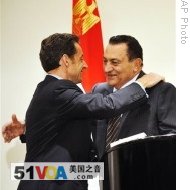Cairo
08 January 2009
Two top Israeli envoys are in the Egyptian capital, Cairo, to attend talks with Egyptian mediators, in a bid to reach a ceasefire in Gaza. Palestinian representatives are meeting with the Egyptians separately.
Egyptian diplomats are conducting grueling diplomatic negotiations with Israeli and Palestinian representatives in Cairo.
 |
| Palestinians gather around the ruins of Al-Noor Mosque following Israeli airstrike in Sheikh Radwan neighborhood of Gaza City, 08 Jan 2009 |
Egyptian Foreign Minister Ahmed Aboul Gheit earlier indicated that Israeli and Hamas negotiators will not meet face-to-face.
Egypt has reportedly been trying to reach a temporary ceasefire between Israel and Hamas, which may later evolve into a permanent ceasefire.
Al Jazeera TV reports that Israeli Defense Ministry envoy Amos Gilad was conferring with Egyptian Intelligence Head, General Omar Suleiman, the architect of a six-month truce last year between Israel and Hamas.
Talks between Egypt and Israel reportedly center around putting an end to weapons smuggling through tunnels into Gaza from the Egyptian side of the border. A ceasefire will reportedly be called, once the border can be secured.
The issue of re-opening border crossings into Gaza remains a stumbling block, because Hamas is insisting they be reopened immediately and unconditionally.
 |
| Egyptian President Hosni Mubarak, right, hugs his French counterpart Nicolas Sarkozy at the end of a press conference in Sharm el-Sheik, Egypt, 06 Jan 2009 |
Mr. Sarkozy indicated that he was grateful to Syrian President Bashar al Assad, and the Emir of Qatar Sheikh Hamad bin Khalifa al-Thani for putting pressure on Hamas to stop its rocket attacks against Israel. Hamas, whose top leader is based in Damascus, is an ally of Syria.
German Prime Minister Merkel said "time is of the essence" and everything must be done to get a quick ceasefire, including guarantees for Israel's security and an end to weapons smuggling.
Also in Paris, Mideast Envoy Tony Blair said he believes a deal is possible if it includes the closing of tunnels under the Gaza-Egypt border and a reopening of border passages.
He says a truce would be a short-term solution, but for the long term, it is absolutely necessary to have a negotiated peace process between Israel and the Palestinians.
Egypt wants the European Union, which helps run the Rafah border post, on the Egyptian border, and the Palestinian Authority of President Mahmoud Abbas, to negotiate the details of reopening the crossing, later.
But Hamas says that European monitors would be considered "hostile forces".
Palestinian sources say President Mahmoud Abbas is due Friday in Cairo to meet with Egyptian President Hosni Mubarak. Israeli Prime Minister Ehud Olmert is also expected to visit Egypt on Saturday or Sunday, but it is not clear if he will meet with Mr. Abbas.